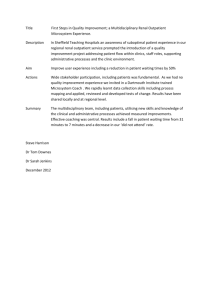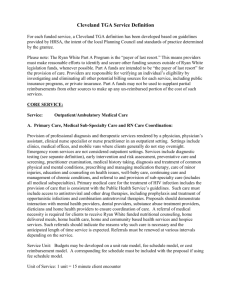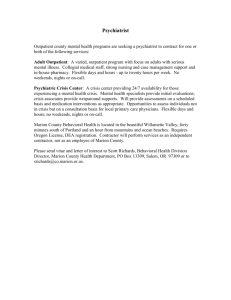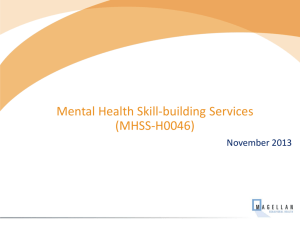Virginia Independent Clinical Assessment Program (VICAP) This
advertisement
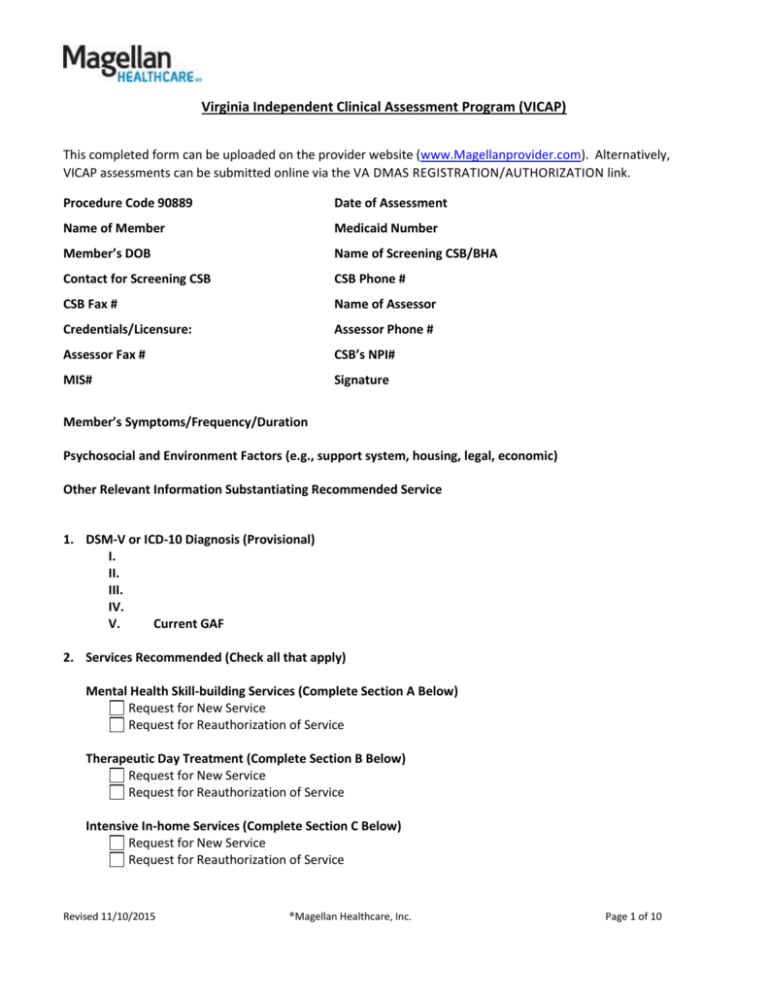
Virginia Independent Clinical Assessment Program (VICAP) This completed form can be uploaded on the provider website (www.Magellanprovider.com). Alternatively, VICAP assessments can be submitted online via the VA DMAS REGISTRATION/AUTHORIZATION link. Procedure Code 90889 Date of Assessment Name of Member Medicaid Number Member’s DOB Name of Screening CSB/BHA Contact for Screening CSB CSB Phone # CSB Fax # Name of Assessor Credentials/Licensure: Assessor Phone # Assessor Fax # CSB’s NPI# MIS# Signature Member’s Symptoms/Frequency/Duration Psychosocial and Environment Factors (e.g., support system, housing, legal, economic) Other Relevant Information Substantiating Recommended Service 1. DSM-V or ICD-10 Diagnosis (Provisional) I. II. III. IV. V. Current GAF 2. Services Recommended (Check all that apply) Mental Health Skill-building Services (Complete Section A Below) Request for New Service Request for Reauthorization of Service Therapeutic Day Treatment (Complete Section B Below) Request for New Service Request for Reauthorization of Service Intensive In-home Services (Complete Section C Below) Request for New Service Request for Reauthorization of Service Revised 11/10/2015 ®Magellan Healthcare, Inc. Page 1 of 10 Virginia Independent Clinical Assessment Program (VICAP) Outpatient Psychotherapy Individual Therapy Group Therapy Family Therapy Psychiatric Residential Treatment Facility – Level C Psychiatric Service (Physician) Group Home Level A Group Home Level B Targeted Case Management Other (Please Specify) No Services Recommended Revised 11/10/2015 ®Magellan Healthcare, Inc. Page 2 of 10 Virginia Independent Clinical Assessment Program (VICAP) Section A Mental Health Skill-building Services (MHSS) Eligibility Assessment Form Service Definition Mental Health Skill-building Services (MHSS) is individualized training to enable members to achieve and maintain community stability and independence in the most appropriate, least restrictive environment. MHSS shall provide training in functional skills and appropriate behavior related to the member’s health and safety; activities of daily living, and use of community resources; assistance with medication management; monitoring health, nutrition, and physical condition. Eligibility Criteria 1. Clinical Necessity YES NO Members qualifying for this service must demonstrate a clinical necessity for the service arising from a condition due to mental, behavioral, or emotional illness that results in significant functional impairments in major life activities. Services are provided to members who require individualized training in order to achieve or maintain stability and independence in the community. NOTE: Members eligible for this service may have a dual diagnosis of either mental illness and mental retardation or mental illness and substance abuse disorder. If a member has co-occurring mental health and substance abuse disorders, integrated treatment for both disorders is allowed within Mental Health Skillbuilding Services as long as treatment for the substance abuse condition is intended to positively impact the mental health condition. 2. The member meets all five (5) of the following criteria in order to be eligible to receive mental health skillbuilding services? (Check elements met) YES NO The member shall be in an independent living situation or actively transitioning into an independent living situation. (Note: If the member is transitioning into an independent living situation, services shall only be authorized for up to six months prior to the date of transition.) The member shall have one of the following as a primary Axis I DSM diagnosis: 1) Schizophrenia or other psychotic disorder as set out in the DSM; 2) Major Depressive Disorder – Recurrent; Bipolar I; or Bipolar II; or 3) Any other Axis I mental health disorder that a physician has documented specific to the identified member with the past year to include all of the following: i Is a serious mental illness or serious emotional disturbance; ii results in severe and recurrent disability; iii produces functional limitations in the member’s major life activities which are documented in the member’s medical record; AND; iv The member requires individualized training in order to achieve or maintain independent living in the community. Revised 11/10/2015 ®Magellan Healthcare, Inc. Page 3 of 10 Virginia Independent Clinical Assessment Program (VICAP) Mental Health Skill-building Services (MHSS) Eligibility Assessment Form (continued) The member shall require individualized training in acquiring basic living skills such as symptom management; adherence to psychiatric and medication treatment plans; development and appropriate use of social skills and personal support system; personal hygiene; food preparation; or money management. The member/family reports or supporting documentation indicates a history of any of the following: Psychiatric hospitalization, Residential crisis stabilization, Intensive Community Treatment (ICT) or Program of Assertive Community Treatment (PACT) services, Placement in a psychiatric residential treatment facility (RTC Level C), or Completion of a preadmission screening evaluation by a CSB/BHA as authorized in 37.2-809b or 16.1-340 as a result of decompensation related to serious mental illness or serious emotional disturbance. Method of Verification: Member/Family Report Supporting Documentation The member shall have had a prescription for anti-psychotic, mood stabilizing, or anti-depressant medications within the 12 months prior to the assessment date. or, A physician or other practitioner licensed to prescribe medications has provided documentation that indicates that anti-psychotic, mood stabilizing, or anti-depressant medication are medically contraindicated for the member. (The provider shall obtain medical records signed by the physician or other licensed prescriber detailing the contraindication. This documentation shall be maintained in the member’s mental health skillbuilding services record.) Method of Verification Member/Family Report Physical evidence such as script/medication Documentation/summary from prescribing provider Other 3. The member meets the criteria and MHSS are recommended? Revised 11/10/2015 ®Magellan Healthcare, Inc. YES NO Page 4 of 10 Virginia Independent Clinical Assessment Program (VICAP) Section B Therapeutic Day Treatment (TDT) Eligibility Assessment Form 1. Functional Capability YES NO The member has the functional capability to understand and benefit from the required activities and counseling of this service. 2. General Eligibility Criteria YES NO The member meets all four of the general eligibility criteria listed below? The member has a mental, behavioral, or emotional illness that results in significant functional impairments in major life activities, compared to other similar aged members, and The disability has become more disabling over time (within the last 30 days), and Significant intervention is required through services that are supportive, intensive, and offered over a protracted period of time in order to provide therapeutic intervention, and The member must demonstrate a clinical necessity for the TDT service arising from a mental, behavioral, or emotional illness that results in significant functional impairments in major life activities. 3. Medical Necessity Criteria YES NO The member meets the specific medical necessity criteria listed below? The member must meet at least two of the following criteria on a continuing or intermittent basis (check elements met): The member has difficulty establishing or maintaining normal interpersonal relationships to such a degree that they are at risk of hospitalization or out-of-home placement because of conflicts with family or community; and/or The member exhibits such inappropriate behavior that documented, repeated interventions by mental health, social services, or judicial system are or have been necessary; and/or The member exhibits difficulty in cognitive ability such that they are unable to recognize personal danger or recognize significantly inappropriate social behavior. (For example, the member is at risk for acting out in such a fashion that will cause harm to themselves or others.) 4. If the first box is checked in question #3 please complete the following Risk of Out-of-Home Placement Criteria (check ANY/ALL elements met below) YES NO Not Applicable During the VICAP assessment (or within the 2 weeks prior to the TDT intake) the member has been screened by an LMHP (including supervisees/residents) for escalating behaviors that have put the member or others at immediate risk of physical injury. The parent or legal guardian is unable to manage the mental, behavioral or emotional problems in the home and is actively seeking alternate out-of-home placement. (This needs to be a current problem, Revised 11/10/2015 ®Magellan Healthcare, Inc. Page 5 of 10 Virginia Independent Clinical Assessment Program (VICAP) Therapeutic Day Treatment (TDT) Eligibility Assessment Form (continued) within the past 2-4 weeks, not a threat of removal from the home that the parent has made in the past and has not acted on.) A representative of either juvenile justice, DSS, CSB, or DOE (or an LMHP who is not an employee or consultant to the TDT provider) has recommended an out-of-home placement unless there is an immediate change in behaviors and failed MH services are evident. The member has a history of unsuccessful services (crisis intervention, crisis stabilization, outpatient psychotherapy, outpatient substance abuse services, or mental health skill-building services) with in the past 30 days. A treatment team or FAPT has recommended TDT services for a member transitioning out of RTC Level C or Level A or B group home; transitioning out of psychiatric hospitalization; transitioning between foster homes, or transitioning between services (mental health case management, crisis intervention, crisis stabilization, outpatient psychotherapy, outpatient substance abuse services). History of Failed Services within the last 30 days: Select all that apply. Crisis Intervention Crisis Stabilization Outpatient Psychotherapy Outpatient Substance Abuse Services Mental Health Skill-building Services Recommendation for TDT by treatment team/FAPT team for a member currently in one of the following: RTC Level C (transition) Group Home Level A or B (transition) Acute Psychiatric Hospitalization (transition) Foster Home (transition or foster parent is unwilling to continue) MH case management, crisis intervention, crisis stabilization, outpatient psychotherapy, or substance abuse services. 5. The member met the additional medical necessity criteria listed below? YES NO The member must meet at least one of the following criteria (check elements met): The member requires year-round treatment in order to sustain behavioral or emotional gains. The member’s behavioral and emotional problems are so severe they cannot be handled in selfcontained or resource emotionally disturbed (ED) classrooms without this programming during the school day or as a supplement to the school day or school year. Without these services the member would otherwise be placed on homebound instruction because of severe emotional or behavioral problems, or both, that interfere with learning. The member has deficits in social skills, peer relations, or dealing with authority; is hyperactive; has poor impulse control; or is extremely depressed or marginally connected with reality. Revised 11/10/2015 ®Magellan Healthcare, Inc. Page 6 of 10 Virginia Independent Clinical Assessment Program (VICAP) Therapeutic Day Treatment (TDT) Eligibility Assessment Form (continued) The member is in a preschool enrichment and/or early intervention program but the member’s emotional or behavioral problems, or both, are so severe that they cannot function in these programs without additional services. 6. The member meets the eligibility criteria and TDT services are recommended? Revised 11/10/2015 ®Magellan Healthcare, Inc. YES NO Page 7 of 10 Virginia Independent Clinical Assessment Program (VICAP) Section C Intensive In-home Services (IIH) Eligibility Assessment Form 1. Functional Capability YES NO The member has the functional capability to understand and benefit from the required activities and counseling of this service. (Note: In the case of a young child, the parent must have functional capacity). 2. Clinical Necessity YES NO Members must demonstrate a clinical necessity arising from a severe condition due to mental, behavioral, or emotional illness that results in significant functional impairment in major life activities. Members must meet at least two of the following criteria on a continuing or intermittent basis (check elements met): Has difficulty in establishing or maintaining normal interpersonal relationships to such a degree that they are at risk of hospitalization or out-of-home placement because of conflicts with family or community; and/or Exhibits such inappropriate behavior that documented, repeated interventions by the mental health, social services, or judicial system are or have been necessary; and/or The member exhibits difficulty in cognitive ability such that they are unable to recognize personal danger or recognize significantly inappropriate social behavior. (For example, the member is at risk for acting out in such a fashion that will cause harm to themselves or others.) 3. Risk of Out-of-Home Placement Criteria (check ANY/ALL elements met below) YES NO During the VICAP assessment (or within the 2 weeks prior to the IIH intake) the member has been screened by an LMHP (including supervisees/residents) for escalating behaviors that have put the member or others at immediate risk of physical injury. The parent or legal guardian is unable to manage the mental, behavioral or emotional problems in the home and is actively seeking alternate out-of-home placement. (This needs to be a current problem, within the past 2-4 weeks, not a threat of removal from the home that the parent has made in the past and has not acted on.) A representative of either juvenile justice, DSS, CSB, or DOE (or an LMHP who is not an employee or consultant to the IIH provider) has recommended an out-of-home placement unless there is an immediate change in behaviors and failed MH services are evident. The member has a history of unsuccessful services (crisis intervention, crisis stabilization, outpatient psychotherapy, outpatient substance abuse services, or mental health skill-building) with in the past 30 days. A treatment team or FAPT has recommended IIH services for a member transitioning out of RTC Level C or Level A or B group home; transitioning out of psychiatric hospitalization; transitioning between foster Revised 11/10/2015 ®Magellan Healthcare, Inc. Page 8 of 10 Virginia Independent Clinical Assessment Program (VICAP) Intensive In-home Services (IIH) Eligibility Assessment Form (continued) homes, or transitioning between services (mental health case management, crisis intervention, crisis stabilization, outpatient psychotherapy, outpatient substance abuse services). History of Failed Services within the last 30 days: Select all that apply. Crisis Intervention Crisis Stabilization Outpatient Psychotherapy Outpatient Substance Abuse Services Mental Health Skill-building Services Recommendation for IIH by treatment team/FAPT team for a member currently in one of the following: RTC Level C (transition) Group Home Level A or B (transition) Acute Psychiatric Hospitalization (transition) Foster Home (transition or foster parent is unwilling to continue) MH case management, crisis intervention, crisis stabilization, outpatient psychotherapy, or substance abuse services. 4. Service Necessity YES NO One of the following must be met in order to justify the need for IIH: Services far more intensive than outpatient clinic are required to stabilize the member in the family situation. The member’s residence, as the setting for services, is more likely to be successful than a clinic. Describe how services in the member’s residence are more likely to be successful than an outpatient clinic: Note: Services may also be used to facilitate treatment after the transition to home from out-of-home placement when services more intensive than outpatient clinic care are required for the transition to be successful. The member and responsible parent or guardian must agree to be available and must agree to participate in the transition. 5. Agreement to Participate in Service YES NO The following must be met: At least one parent or responsible adult with whom the member is living must be willing to participate in intensive in-home services, with the goal of keeping member with the family. A responsible adult is any adult Intensive In-home Services (IIH) Eligibility Assessment Form (continued) Revised 11/10/2015 ®Magellan Healthcare, Inc. Page 9 of 10 Virginia Independent Clinical Assessment Program (VICAP) who lives in the same household with the member and is responsible for engaging in therapy and servicerelated activities to benefit the member. 6. The member meets the eligibility criteria and IIH services are recommended? Revised 11/10/2015 ®Magellan Healthcare, Inc. YES NO Page 10 of 10
